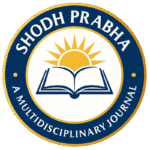Shodh Prabha: A Multidisciplinary Journal maintains a strict policy against plagiarism and unethical publication practices. The journal follows the guidelines prescribed by the Committee on Publication Ethics (COPE) and the University Grants Commission (UGC) for ensuring academic integrity and originality in all published works.
1. Definition of Plagiarism:
Plagiarism is the act of using another person’s ideas, words, data, or results without proper acknowledgment or permission. It includes copying, paraphrasing, or reproducing text, tables, figures, or any part of previously published work as one’s own.
2. Types of Plagiarism:
- Complete Plagiarism: Submitting another’s entire work as one’s own.
- Partial Plagiarism: Copying significant portions or sections from another source without proper citation.
- Self-Plagiarism: Republishing one’s own previously published work, data, or findings without proper reference or justification.
- Mosaic Plagiarism: Mixing copied phrases or ideas with original content without acknowledgment.
- Source-Based Plagiarism: Incorrect or fabricated citation of sources or misrepresentation of another’s work.
3. Plagiarism Detection:
All manuscripts submitted to Shodh Prabha are screened for plagiarism using advanced plagiarism detection software such as Turnitin, iThenticate, or Grammarly Premium before the peer review process. The similarity index is calculated, and any manuscript exceeding the permissible limit will not be processed further.
4. Acceptable Similarity Index:
- The acceptable similarity level should not exceed 10% (excluding references, quotations, and standard methodological text).
- Manuscripts with similarity between 10–20% may be sent back to authors for revision and correction.
- Manuscripts with similarity above 20% will be rejected outright and will not be reconsidered for publication.
5. Author Responsibility:
Authors are solely responsible for the originality of their work. They must ensure that all content is properly cited, paraphrased, and acknowledged. Authors should not submit any manuscript that has been published previously or is under review elsewhere.
6. Editorial Action on Plagiarism:
If plagiarism is detected during the initial screening or peer review process:
- The manuscript will be immediately rejected.
- Authors may be blacklisted from future submissions.
If plagiarism is discovered after publication: - The article will be retracted from the website and indexing databases.
- A formal notice of retraction will be published in the next issue.
- The author’s institution may be notified about the misconduct.
7. Self-Plagiarism Policy:
Authors must not reuse substantial parts of their own published work without proper citation. Reusing one’s data or text without acknowledgment is considered self-plagiarism and will be treated as a serious ethical violation.
8. Citation and Acknowledgment:
Proper citation of all sources is mandatory. Authors must acknowledge any material, data, idea, or sentence borrowed from previously published works, including their own.
Shodh Prabha: A Multidisciplinary Journal is committed to promoting academic honesty and maintaining the highest ethical standards in research publication.
